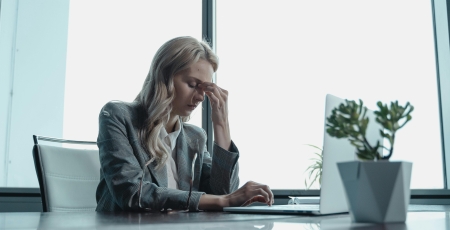Have you ever experienced that guilty feeling when you’re working from home, and you turn off your computer?
You’re about to turn on the tv or go for a walk and then the thoughts begin. Maybe I should still be working?
I haven’t opened all those unread emails. I should probably just finish that project proposal. One more hour won’t hurt, will it? Then one hour becomes two. You have a quick dinner and then you’re just going to finish those last few emails. Before you know it, it’s time for bed, but you can’t sleep because you’re wired and you’re still thinking about work, even though you worked far more hours than you should have this week!
Yes, sadly you may recognise this pattern. It certainly seems to be becoming a common theme amongst women these days and is something I experience myself. When the pandemic forced us to work from home and the lines between work and home life became increasingly intertwined, I began to experience burnout. I was working 12-hour days, eating lunch at my desk while replying to emails, forgoing daily walks to finish presentations, and struggling to sleep at night. I would wake up exhausted the next morning but log onto my computer and keep the same routine. I would even find myself working on the weekend, feeling that I should be “productive” during my time at home. At the time I didn’t know I was burnt out, I thought that I was just working hard. I was feeling constantly tired, helpless, had a negative outlook on my work, consistently felt overwhelmed and lacked enjoyment or excitement for anything. If you felt like this, would you recognise it as burnout?
The World Health Organisation has dubbed burnout as the modern-day health epidemic, and the numbers of us experiencing burnout is likely to continue with increased hybrid working models. Burnout is described as a state of emotional, physical and mental exhaustion caused by excessive and prolonged stress and some of the key symptoms include feelings of stagnation, difficulty in keeping healthy habits, an inability to concentrate and feeling like you’re never doing enough. Maybe you’re thinking twice now about whether you’re experiencing burnout?
Burnout can be difficult to identify because it is easily mistaken for stress, especially as for many it is related to work. The main difference is that when under stress people can still imagine that if they get everything under control, they will feel better again. But people who are burnt out often do not see any hope of positive change in their situations. People who are stressed are usually over engaged at work, while those who are burnt out are disengaged. Some burnout symptoms are physical, for example, high blood pressure, recurring headaches and getting sick more often, but they are not always recognised.
Gender, and interestingly age, are both influencing factors when it comes to experiencing burn out. More women and young people report feeling more prone to extreme stress and pressure at work and burnout. According to a Future Forum study in March 2023, 46% of women reported symptoms of burnout (much higher than men at 37%). Maybe this is compounded by other factors; women often still do the majority in domestic settings (including cooking, cleaning, childcare and caring for elderly relatives) which can contribute to increased feelings of stress.
Burnout doesn’t go away on its own – it can worsen if not recognised and managed and while outside intervention, including speaking to your GP, can help, it is important that you try to prioritise looking after yourself (after all, you can’t pour from an empty cup!). The tips below have personally worked for me, and while they may seem small, they have made huge differences to how I manage myself and my personal time.
1) Make time for yourself.
When you create your to-do list, how often do you include something that is important to you? Maybe reading your favourite book, catching up on that TV show or having a quick walk over lunchtime. Factoring in yourself alongside everything else will help you establish healthy personal boundaries, and these are essential to avoiding burnout. On my daily task list, I make sure that I include one thing that will bring me personal joy that day!
2) Take regular breaks.
I know this is easier said than done – but it is so important especially when you’re working in a very busy environment. Do you block out your lunch breaks in your diary and make it clear you don’t want any meetings to go in? Are you guilty of logging back in after you have put the children to bed? I now have a clear lunchtime and finish time in my diary – that way people know I am not available during/after those hours. It also means that I can actually enjoy my evenings, rather than thinking I should be finishing off that presentation for next week…
3) Move your body.
Exercise is vital for maintaining mental fitness, and it can reduce stress. Studies show that it is very effective at reducing fatigue, improving alertness and concentration, and enhancing overall cognitive function. Being active doesn’t necessarily mean a trip to the gym, just getting outside in the fresh air for a brisk walk can be very beneficial! Now that the evenings are lighter, and the sun is showing itself more often I am making it my personal mission to be outside walking for at least 30 minutes a day to enjoy it.
4) Eat well.
Comfort and healthy foods, like a bowl of warm porridge, fruit and vegetables and dark chocolate can boost levels of serotonin. Other processed, caffeinated, or sugary foods can exacerbate stress levels. A healthy diet can help counter the impact of stress by boosting the immune system and lowering blood pressure – you also need to drink more water! I bought myself one of those huge 2 litre water bottles and make sure that I drink one of those a day. Having this visual reminder has really helped!
5) Sleep
Chances are if you’re burnt out, you’re not sleeping well – so rather than telling you to get enough sleep, I’m asking you to have good sleep hygiene. I don’t look at devices last thing before bed, I try to read a book for 30 minutes and write a to-do list for the next day, so those thoughts are out of my mind! I make sure my room is dark and quiet too, as that’s been shown to improve sleep quality. Some people take a warm bath, I have a lavender pillow spray. It’s the routine that makes a big different to your sleep, so find the one that works for you.
6) Share how you feel.
Speak to someone – if you are experiencing burnout then I really encourage you to reach out for support. Ideally reach out to a medical professional or your GP. Speak to your manager too and ask them to support you during this period. I shared how I felt with my team and realised that they felt similarly, so we agreed with each other to check in regularly and make sure none of us were working after 6pm.
7) And finally – be kind to yourself.
Life is hard and complex enough without being your own worst enemy. Remind yourself that you are doing your best and even doing one or two of the above might help relieve some of the pressure you feel.
I don’t manage to do all of the above every day, but I am certainly more aware of how to properly look after myself and now I see relaxing as valuable and worthy time too. So, even if you are not suffering burnout remember that prevention is better than cure!
Which one of the areas are you neglecting the most? What one change could you make this week to help get into healthier habits and reduce the possibility of burnout? How can you prioritise yourself on your to do list? I look forward to hearing how you got on!


